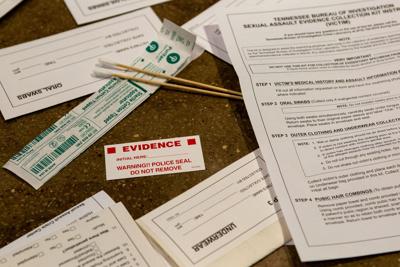The September killing of Memphis teacher Eliza Fletcher was met with public outrage and memorials, as well an announcement that the Tennessee Bureau of Investigation forensic lab would fill 25 new positions. But more than four months later, those positions are still unfilled.
Among those prospective positions are 20 scientists and five administrative support positions, including eight positions in the bureau’s Jackson lab, 11 in the Nashville lab and six in the Knoxville lab. As of Feb. 1, the TBI says the hiring process for those positions is “active and ongoing,” though it’s unclear when the agency expects to have them all filled.
“Labs across the country face hiring challenges for qualified forensic talent,” TBI communications director Josh DeVine tells the Scene in an email, noting that “current TBI compensation makes this difficult.”
“Overall, we’re pleased [with] the pool of candidates we have seen for our positions, but certainly believe increased salaries could help us better recruit and retain scientists.”
In addition to passing the initial interview process and meeting other job requirements, those new hires must also undergo 18 months of training prior to taking on a role that includes working cases, testifying in court and responding to crime scenes.
According to the TBI’s 2021 statewide crime data, the latest available, there were 2,367 reported incidents of forcible rape, while the Metro Nashville Police Department reported 521 rapes in 2022. According to the National Sexual Violence Resource Center, 63 percent of rapes go unreported to law enforcement, making it the most underreported crime in the United States. National nonprofit Joyful Heart Foundation’s End the Backlog program reports that “Tennessee has achieved four of six pillars of rape kit reform,” with the group citing backlogged testing and reform funding as issues that need to be addressed by the state.
The TBI provided the Scene with data on sexual assault kits (SAKs) that have been submitted and are awaiting testing as of Jan. 30, revealing a total of 717 kits in the statewide system — 422 of those have been in the system more than 90 days. DeVine says the TBI doesn’t regularly keep records of the number of outstanding SAKs submitted from each specific agency across the state, adding that more clear data is complicated by the nature of how crimes are reported and categorized. TBI data from December did reveal turnaround testing times from forensic biology units from each of the three labs, with Nashville at 26 weeks, Knoxville at 39.7 weeks and Jackson at 43.8 weeks for sex-offense crime testing.
The agency also reported that since 2019, Nashville’s forensic biology unit has averaged 78.9 case submissions per month, or 6.1 case submissions per scientist. The numbers show an average of 59.6 case submissions per month, or 6.7 case submissions per scientist in Knoxville; and an average of 54.2 case submissions per month, or 5.4 case submissions per scientist in Jackson.
DeVine says the TBI has “the highest number of submitted requests analyzed per scientist,” and cites a West Virginia University Department of Business forensic laboratory staffing calculator determining that the TBI crime laboratories required an additional 71 positions based on 2019-20 data. In order to boost efficiency, the agency reports that in July it restructured its Forensic Services Divison and recently implemented Y-screening, a “presumptive test to quickly determine the presence of the male Y-chromosome, as males are most often offenders in sexual assault cases.”
The pressure to speed up testing may continue to build. A bill has been introduced in the current state legislative session that would require the TBI to test evidence within 30 days.
“The governor and General Assembly provided critical support to the TBI in this most recent budget to begin addressing those challenges,” DeVine says. “While it would be premature to discuss specific legislation at this time, the discussions we’ve had about long-term solutions have us optimistic for a fix that better positions the bureau for its future.”
In 2018, the Sexual Assault Center opened its Sexual Assault Forensic Exam (SAFE) Clinic in North Nashville, which administers sexual assault forensic exams and provides other resources. (Read more on that here.)
“The detectives that we work with are fantastic,” says Kelly Peters, director of advocacy and director of the SAFE Clinic at the Sexual Assault Center. “They know how to respond in a trauma-informed way, they are educated on sexual violence, they know how to approach a victim to keep them comfortable and engaged.”
Peters says survivors who utilize the center’s services are not required to report the crime to police, but that the center’s positive working relationships with MNPD detectives who specialize in sex crimes mean they can help connect a survivor with trusted law enforcement officials.
“Of course, we want them to [report to law enforcement] so offenders can be held accountable, but it’s their choice, and we will support whatever decision they make,” Peters says.
“Having that relationship and wrapping those services around [a] victim just helps the process from reporting and coming in for an exam, to getting the healing services that you need, to holding offenders accountable and moving forward with a prosecution.”
Trauma-informed care is at the forefront at five locations in Nashville






